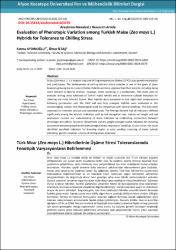| dc.contributor.author | Aydınoğlu, Fatma | |
| dc.contributor.author | İltaş, Ömer | |
| dc.date.accessioned | 2021-09-23T10:45:48Z | |
| dc.date.available | 2021-09-23T10:45:48Z | |
| dc.date.issued | 17.03.2020 | en_US |
| dc.identifier.citation | Aydinoglu, F. & İltaş, Ö. (2020). Genetic Variation among Turkish Maize (Zea mays L.) Hybrids for Tolerance to Chilling Stress . Afyon Kocatepe Üniversitesi Fen Ve Mühendislik Bilimleri Dergisi , 20 (1) , 10-18 . DOI: 10.35414/akufemubid.663739 | en_US |
| dc.identifier.uri | https://doi.org/10.35414/akufemubid.663739 | |
| dc.identifier.uri | https://dergipark.org.tr/tr/pub/akufemubid/issue/53078/663739 | |
| dc.identifier.uri | https://hdl.handle.net/11630/9233 | |
| dc.description.abstract | Maize (Zea mays L.) is a tropical crop and chilling temperatures (below 15 ºC) cause growth retardation and yield losses. The development of chilling-tolerant maize varieties is one of the goals of plant breeders growing maize in cool climates. Hybrids are more vigorous than their parents, including being more tolerant to diverse stresses. However, stress screening is a problematic. This study aims to evaluate chilling stress tolerance of Turkish maize hybrids and to determine suitable indicators for selecting the most tolerant hybrid. Nine hybrids were subjected to low night-time temperatures following germination until the third leaf was fully enlarged. Hybrids were evaluated at the morphological, cellular and physiological levels by comparison with control seedlings. The data were subjected to kinematic analysis and statistical tools. The findings showed that all indicators differed significantly among the hybrids. Indicators such as leaf elongation rate, mature cell length and cell production increase our understanding of stress tolerance by establishing connections between phenotype and cellular functions. Shoot fresh and dry weight emerged useful indicators for revealing association between growth and the physiological stress response of seedlings. In conclusion, this study identified beneficial indicators for breeding studies at early seedling screening of maize hybrids exhibiting genetic variation in terms of chilling stress tolerance. | en_US |
| dc.description.abstract | Mısır (Zea mays L.) tropikal orjinli bir bitkidir ve düşük sıcaklıklar (15 ᵒC'nin altında) büyüme inhibisyonuna yol açarak verim kayıplarına neden olur. Bu nedenle, üşüme stresine dayanıklı mısır çeşitlerinin geliştirilmesi, serin iklimlerde mısır yetiştirebilmek için mısır ıslahçılarının temel amaçları arasındadır. Hibridler, çeşitli streslere daha toleranslı olduklarından ebeveynlerine göre üstündür. Ancak, stres taramasının yapılması zordur. Bu bağlamda, çalışma, Türk mısır hibritlerinin üşüme stres toleranslarını değerlendirmeyi ve en toleranslı hibrit seçiminde uygun belirteçleri belirlemeyi amaçlamaktadır. Bu doğrultuda dokuz farklı genotipe sahip mısır hibridi, çimlenmelerinin ardından üçüncü yaprakları tamamen olgunlaşıncaya kadar düşük gece sıcaklığına maruz bırakılmıştır. Üşümeye maruz bırakılan hibridler, kontrol şartlarında yetiştirilen fideler ile karşılaştırılarak stres toleransları morfolojik, hücresel ve fizyolojik seviyelerde değerlendirilmiştir. Veriler kinematik analiz ve istatistiksel araçlar ile analiz edilmiştir. Bulgulara göre, tüm stres belirteçleri hibridler arasında önemli derecede farklılık göstermiştir. Yaprak uzama oranı (LER), olgun hücre uzunluğu (MCL) ve hücre üretimi (CP) gibi belirteçler, fenotip ve hücresel fonksiyonlar arasında bağlantı kurmaya olanak sağladığından stres tolerans mekanizmasını anlamamızda faydalı olduğu görülmüştür. Bununla birlikte, taze ve kuru fide ağırlığının (SFW ve SDW) fidelerin büyüme ile fizyolojik stres tepkisi arasındaki ilişkiyi ortaya çıkarmak için yararlı göstergeler olduğu saptanmıştır. Sonuç olarak, bu çalışma, genetik varyasyon sergilediği gözlenen üşüme stresi toleransı geliştirmeyi amaçlayan ıslah çalışmalarında mısırın erken aşamada taranabilmesine olanak sağlayan bir yaklaşım sunmaktadır. | en_US |
| dc.language.iso | eng | en_US |
| dc.publisher | Afyon Kocatepe Üniversitesi | en_US |
| dc.identifier.doi | 10.35414/akufemubid.663739 | en_US |
| dc.rights | info:eu-repo/semantics/openAccess | en_US |
| dc.subject | Hybrid Seed | en_US |
| dc.subject | Chilling Stress | en_US |
| dc.subject | Stress İndicators | en_US |
| dc.subject | Genetic Variation | en_US |
| dc.subject | Zea Mays | en_US |
| dc.subject | Hibrit Tohum | en_US |
| dc.subject | Üşüme Stresi | en_US |
| dc.subject | Stres Belirteçleri | en_US |
| dc.subject | Fenotipik Varyasyon | en_US |
| dc.title | Genetic variation among Turkish Maize (Zea mays L.) hybrids for tolerance to chilling stress | en_US |
| dc.title.alternative | Türk Mısır (Zea mays L.) hibridlerinin üşüme stresi toleranslarında fenotipik varyasyonların belirlenmesi | en_US |
| dc.type | article | en_US |
| dc.relation.journal | Afyon Kocatepe Üniversitesi Fen ve Mühendislik Bilimleri Dergisi | en_US |
| dc.department | Seçiniz | en_US |
| dc.authorid | 0000-0002-9974-045X | en_US |
| dc.authorid | 0000-0003-4614-6673 | en_US |
| dc.identifier.volume | 20 | en_US |
| dc.identifier.startpage | 10 | en_US |
| dc.identifier.endpage | 18 | en_US |
| dc.identifier.issue | 1 | en_US |
| dc.relation.publicationcategory | Makale - Ulusal Hakemli Dergi - Başka Kurum Yazarı | en_US |



















